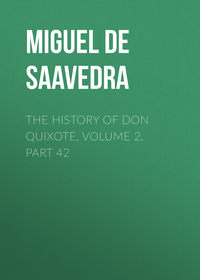Kitap dosya olarak indirilemez ancak uygulamamız üzerinden veya online olarak web sitemizden okunabilir.
Kitabı oku: «The History of Don Quixote, Volume 2, Part 42»
CHAPTER LXXIII.
OF THE OMENS DON QUIXOTE HAD AS HE ENTERED HIS OWN VILLAGE, AND OTHER INCIDENTS THAT EMBELLISH AND GIVE A COLOUR TO THIS GREAT HISTORY
At the entrance of the village, so says Cide Hamete, Don Quixote saw two boys quarrelling on the village threshing-floor one of whom said to the other, "Take it easy, Periquillo; thou shalt never see it again as long as thou livest."
Don Quixote heard this, and said he to Sancho, "Dost thou not mark, friend, what that boy said, 'Thou shalt never see it again as long as thou livest'?"
"Well," said Sancho, "what does it matter if the boy said so?"
"What!" said Don Quixote, "dost thou not see that, applied to the object of my desires, the words mean that I am never to see Dulcinea more?"
Sancho was about to answer, when his attention was diverted by seeing a hare come flying across the plain pursued by several greyhounds and sportsmen. In its terror it ran to take shelter and hide itself under Dapple. Sancho caught it alive and presented it to Don Quixote, who was saying, "Malum signum, malum signum! a hare flies, greyhounds chase it, Dulcinea appears not."
"Your worship's a strange man," said Sancho; "let's take it for granted that this hare is Dulcinea, and these greyhounds chasing it the malignant enchanters who turned her into a country wench; she flies, and I catch her and put her into your worship's hands, and you hold her in your arms and cherish her; what bad sign is that, or what ill omen is there to be found here?"
The two boys who had been quarrelling came over to look at the hare, and Sancho asked one of them what their quarrel was about. He was answered by the one who had said, "Thou shalt never see it again as long as thou livest," that he had taken a cage full of crickets from the other boy, and did not mean to give it back to him as long as he lived. Sancho took out four cuartos from his pocket and gave them to the boy for the cage, which he placed in Don Quixote's hands, saying, "There, senor! there are the omens broken and destroyed, and they have no more to do with our affairs, to my thinking, fool as I am, than with last year's clouds; and if I remember rightly I have heard the curate of our village say that it does not become Christians or sensible people to give any heed to these silly things; and even you yourself said the same to me some time ago, telling me that all Christians who minded omens were fools; but there's no need of making words about it; let us push on and go into our village."
The sportsmen came up and asked for their hare, which Don Quixote gave them. They then went on, and upon the green at the entrance of the town they came upon the curate and the bachelor Samson Carrasco busy with their breviaries. It should be mentioned that Sancho had thrown, by way of a sumpter-cloth, over Dapple and over the bundle of armour, the buckram robe painted with flames which they had put upon him at the duke's castle the night Altisidora came back to life. He had also fixed the mitre on Dapple's head, the oddest transformation and decoration that ever ass in the world underwent. They were at once recognised by both the curate and the bachelor, who came towards them with open arms. Don Quixote dismounted and received them with a close embrace; and the boys, who are lynxes that nothing escapes, spied out the ass's mitre and came running to see it, calling out to one another, "Come here, boys, and see Sancho Panza's ass figged out finer than Mingo, and Don Quixote's beast leaner than ever."
So at length, with the boys capering round them, and accompanied by the curate and the bachelor, they made their entrance into the town, and proceeded to Don Quixote's house, at the door of which they found his housekeeper and niece, whom the news of his arrival had already reached. It had been brought to Teresa Panza, Sancho's wife, as well, and she with her hair all loose and half naked, dragging Sanchica her daughter by the hand, ran out to meet her husband; but seeing him coming in by no means as good case as she thought a governor ought to be, she said to him, "How is it you come this way, husband? It seems to me you come tramping and footsore, and looking more like a disorderly vagabond than a governor."
"Hold your tongue, Teresa," said Sancho; "often 'where there are pegs there are no flitches;' let's go into the house and there you'll hear strange things. I bring money, and that's the main thing, got by my own industry without wronging anybody."
